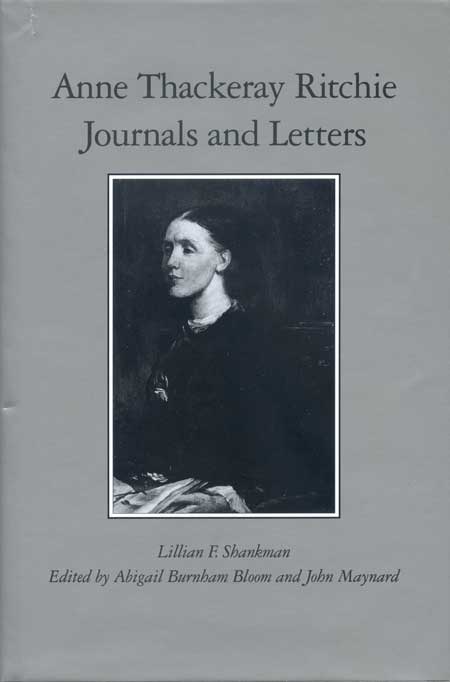Anne Thackeray RitchieJournals and LettersLillian F. Shankman. Edited by Abigail Burnham Bloom and John MaynardStudies in Victorian Life and Literature |
 1/01/1994 372 pp. 6x9 | |||
|
“The availability of this carefully edited selection of letters and, especially, of the full texts of the personal memoirs Anne Thackeray Ritchie wrote in 1864–65 and 1878 should greatly help our reassessment of a cultural continuum in which she played a major part. There is a further dividend since, aided by the late Lillian Shankman’s framing narrative, we also become privy to a moving biographical drama. In this story of integrity and self-assertion, a devoted Victorian daughter gradually finds that she can remain true to her bonds to the past without therefore having to sacrifice the full emotional and intellectual independence she so richly deserves. Like the actual women artists about whom she wrote and the imaginary heroines she created, ‘Anny’ Thackeray thus managed to rise above the ‘dead hand’ of the past that had oppressed women in so many other Victorian fictions.” —U. C. Knoepflmacher, Princeton University Peopled with such literary figures as Tennyson, Trollope, Browning, George Eliot, Henry James, and Virginia Woolf, this book provides Anne Thackeray Ritchie’s complete journals written in 1864–65 and 1878, an ample selection of her most interesting letters, and a number of significant letters written to her. Because only small portions of each journal have been previously published, this important collection presents an essential document of Ritchie’s inner life, especially the account of her response to her father’s death. As the daughter of William Makepeace Thackeray, Anne Thackeray Ritchie was well acquainted with the literary social scene of London. At an early age she became her father’s companion and hostess after her mother went permanently insane; like her father, she became a best-selling writer of novels and articles. Her journals and letters offer a portrait of Ritchie, of her relationship with her father, and of mid-Victorian middle-class life in London and abroad. Lillian Shankman’s lively narrative creates a useful context that enables the reader to follow the treads of biography and major themes in Ritchie’s thinking and works. Shankman furnishes the reader with an accurate and warm account of Ritchie’s exceptional life and milieu and her development as a woman of letters. Any future discussion of Ritchie must include this volume. Lillian Shankman wrote her doctoral dissertation at New York University on Anne Thackeray Ritchie under Gordon Ray and was revising it for publication at the time of her death. Abigail Burnham Bloom teaches courses at New York University and the New School and is managing editor of Victorian Literature and Culture. John Maynard is professor of English at New York University and coeditor of Victorian Literature and Culture. Among his publications are Browning’s Youth, Charlotte Brontë and Sexuality, and Victorian Discourses on Sexuality and Religion. | ||||

